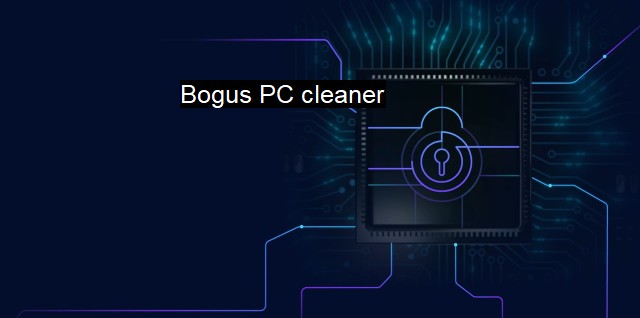What is Bogus PC cleaner?
Battling the Threat of Bogus PC Cleaners: What You Need to Know
"Bogus PC cleaner" , as the moniker suggests, is a type of insecure software or malware disguised as a device optimization tool. These aren't tantamount to the benevolent and valuable applications that offer optimization features to keep operating systems functioning smoothly. Quite the contrary, these dubious programs are notorious for exploiting the seeming ingenuity of unsuspecting users under the pretext of purging clutter, improving processing time, and enhancing computer performance overall. Originating typically from unsecure sources or disguised in deceitful pop-up ads, they carry considerable ramifications for system safety and constitute a severe cybersecurity concern.Understanding a "bogus PC cleaner"'s characteristics and the potential threats it poses is critical. At first glimpse, these malicious programs bear an uncanny resemblance to legitimate software — they come with a professional and sophisticated user interface, detailed description of functions they purportedly serve, and promises of discernible benefits once installed. For instance, they may claim to delete temporary files, fix broken registries, or scan and eliminate potential viruses from the system.
The toxic nature of these nefarious applications unfolds after installation when they showcase a pattern of intrusive and harmful activities. For starters, they agitate the user's experience via regular prompts seeking permissions for high-level system changes or incessant reminders of subscription renewals. In more significant terms, they degrade system performance instead of improving it—impose order lessly on computer resources, create unnecessary log files, trigger disruptive advertisements, and even prevent genuine antivirus software from performing its expected duties. There's also a worrying potential for these applications to surreptitiously mine sensitive information like passwords or bank account details, engendering elevated risks of identity theft or privacy invasion.
The bogus PC cleaners conform to one common motif: inducing fear by particularly endorsing an imaginary imperative scenario often involuntarily gagging users into paying for a full-priced subscription to salvage their computer health. Most novice users fall prey to this trickery unquestioningly, believing their PC is genuinely threatened — whether by redundant files, possible malware or overdue updates. By priming panic, the creators of these applications manage to spin a deceitful web amidst which the financial costs are the most reciprocal yet least damaging consequences.
The repertoire of 'bogus PC cleaners’ may include recognizable names such as PCOptimizer Pro, RegistryCleanerXP, or WinFixer, all alluring with their fancy interfaces and convincingly reassuring verbiage. experts in cybersecurity strongly advise against indulging in these scam-driven programs. There are authentic, trusted and credible cleaning tools available both bundled within operating systems and from third-party resources promising effective management of system resources devoid of malignant intentions.
The antivirus sector categorizes bogus PC cleaners under the umbrella of Potentially Unwanted Programs (PUPs). Antivirus tools employ heuristic algorithms to combat an assortment of such deceptive software and relay timely warnings, thus creating a secure buffer against the onslaught of bogus PC cleaners. Yet, users share the onus to maintain system security by abstaining from ad hoc downloads, suspicious links click-on, or installation of unauthorized software.
In short, a Bogus PC cleaner is a wolf in sheep’s clothing – a foe masquerading as a friend. It raises serious cybersecurity concerns as it typically fuels its damaging spree on the supposed enhancement of system performance, while exploiting the gullibility or technical unacquaintance of users, pilfering sensitive data, and introducing potentially detrimental applications to the system. A prudent approach towards unfamiliar software, observant monitoring of system behavior, and brokering trust with only reputed, authentic PC cleaning utilities and antivirus protection should be taken seriously to eliminate this threat.

Bogus PC cleaner FAQs
What is a bogus PC cleaner?
A bogus PC cleaner is a fake antivirus software that claims to clean your PC but actually harms your computer by installing malware, spyware or a virus on your system.How can I identify a bogus PC cleaner?
A bogus PC cleaner often pops up through an unsolicited pop-up ad or a fake system alert message. It may also promise unrealistic results, ask for payment to fix issues, or constantly scan your computer without your permission.What are the risks of using a bogus PC cleaner?
Using a bogus PC cleaner can cause financial loss, identity theft, and damage to your computer, as it infects your system with malware, spyware, or a virus. It can also steal personal data and credentials, leading to hacking attempts on your other online accounts.How can I protect my computer from a bogus PC cleaner?
To protect your computer from a bogus PC cleaner, make sure to install a trusted antivirus software and keep it updated. Avoid clicking on unsolicited pop-up ads, downloading free software from unsecured websites, and clicking on links in spam emails. Always be cautious and do your research before downloading or installing anything on your computer.| | A | | | B | | | C | | | D | | | E | | | F | | | G | | | H | | | I | | | J | | | K | | | L | | | M | |
| | N | | | O | | | P | | | Q | | | R | | | S | | | T | | | U | | | V | | | W | | | X | | | Y | | | Z | |
| | 1 | | | 2 | | | 3 | | | 4 | | | 7 | | | 8 | | |||||||